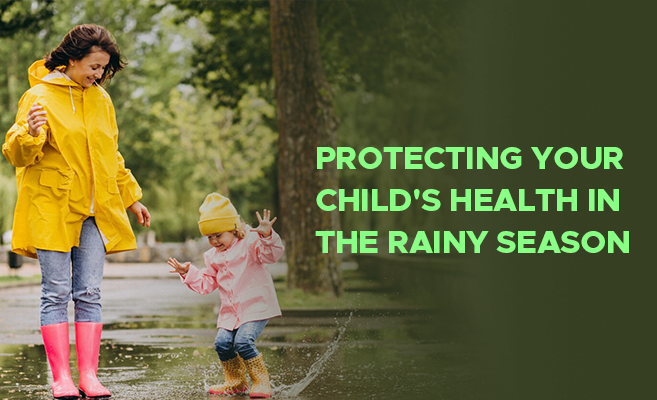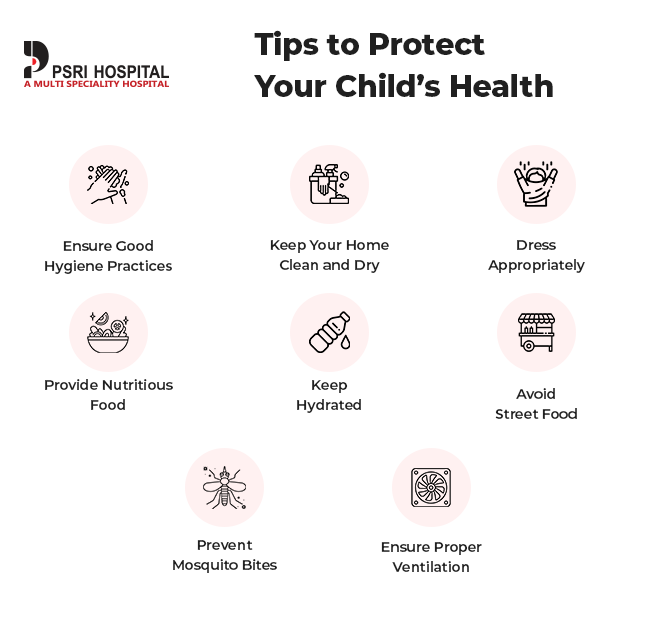Protecting Your Child’s Health in the Rainy Season

During the rainy season, the environment becomes a breeding ground for bacteria, viruses, and other pathogens. Stagnant water, increased humidity, and fluctuating temperatures create ideal conditions for the spread of infectious diseases. Children are more susceptible to infections and illnesses during this time due to their developing immune systems and the increased prevalence of germs and allergens. In this blog, we will discuss why children might fall sick easily during the rainy season, provide tips to protect your child’s health, and explain when to see a doctor.
Why Children Might Fall Sick Easily During the Rainy Season
Children are vulnerable because:
Weaker Immune Systems: Children’s immune systems are still developing, making them less capable of fighting off infections compared to adults.
Increased Exposure: Children tend to play outdoors and come into contact with contaminated water and surfaces more often.
Close Contact: In schools and playgrounds, children are in close contact with each other, facilitating the spread of germs.
Lack of Awareness: Younger children may not always understand the importance of hygiene, such as washing hands regularly or avoiding dirty water.

Tips to Protect Your Child’s Health in the Rainy Season
Protecting your child’s health during the rainy season requires a combination of good hygiene practices, proper nutrition, and vigilance. Here are some practical tips to keep your child healthy:
Ensure Good Hygiene Practices: Teach your child the importance of washing hands regularly with soap and water, especially before eating and after using the bathroom. Encourage them to avoid touching their face, nose, and mouth with unwashed hands.
Keep Your Home Clean and Dry: Ensure that your home is clean and free from stagnant water. Use disinfectants to clean surfaces and keep humidity levels in check. A dry and clean environment helps prevent the growth of mold and bacteria.
Dress Appropriately: Dress your child in weather-appropriate clothing. Ensure they wear waterproof jackets, boots, and carry umbrellas to stay dry. Wet clothing can lead to chills and increase the risk of respiratory infections.
Provide Nutritious Food: A healthy diet boosts the immune system. Include plenty of fruits, vegetables, and whole grains in your child’s diet. Foods rich in vitamin C, such as oranges, strawberries, and spinach, can help strengthen their immune system.
Keep Hydrated: Encourage your child to drink plenty of clean water. Proper hydration is essential for maintaining good health and flushing out toxins.
Avoid Street Food: During the rainy season, avoid giving your child street food, as it is more likely to be contaminated. Opt for home-cooked meals and snacks to ensure they are consuming safe and nutritious food.
Prevent Mosquito Bites: Use mosquito repellents, nets, and coils to protect your child from mosquito bites. Mosquitoes thrive during the rainy season and can transmit diseases like dengue and malaria.
Ensure Proper Ventilation: Good ventilation helps keep indoor air fresh and reduces the risk of respiratory infections. Open windows to allow fresh air to circulate, but avoid drafts that could chill your child.
When to See a Doctor
Despite taking precautions, children may still fall sick. It is important to recognize the signs that indicate it’s time to see a doctor. Here are some symptoms to watch for:
Persistent Fever: If your child has a fever that lasts more than two days or is very high, consult a doctor immediately.
Severe Cough or Cold: Persistent coughs and colds, especially if accompanied by difficulty breathing or wheezing, should be evaluated by a healthcare professional.
Diarrhea or Vomiting: Frequent diarrhea or vomiting can lead to dehydration, which is dangerous for children. Seek medical help if these symptoms persist.
Rash or Skin Infections: Skin rashes, boils, or other infections should be checked by a doctor to prevent complications.
Fatigue or Weakness: Unusual tiredness or weakness that doesn’t improve with rest may indicate an underlying issue that needs medical attention.
Ear Pain or Discharge: Ear infections are common during the rainy season. If your child complains of ear pain or you notice discharge, visit a doctor.
PSRI Hospital Provides the Best Treatments and Care
Choosing the right healthcare provider is crucial for your child’s health. PSRI Hospital is the best hospital in Delhi, known for its exceptional care and advanced facilities. From routine check-ups to specialized treatments like heart surgery, PSRI Hospital offers a wide range of medical services. It is also recognized as the best hospital for heart surgery in India. As one of the top hospitals in Delhi NCR, PSRI Hospital has a proven track record of successful treatments and satisfied patients. For the highest quality healthcare services, trust PSRI Hospital to provide the care your child needs to stay healthy and happy.
FAQs
Why do children fall sick more often during the rainy season?
Ans. Children have developing immune systems and are more exposed to germs, making them more vulnerable to infections during the rainy season.
How can I protect my child from getting sick during the rainy season?
Ans. Ensure good hygiene, keep your home clean and dry, provide nutritious food, and prevent dengue by mosquito bites.
When should I take my child to see a doctor?
Ans. See a doctor if your child has persistent fever, severe cough, diarrhea, vomiting, rash, or unusual tiredness.
Why choose PSRI Hospital for my child’s healthcare needs?
Ans. PSRI Hospital offers expert medical care, advanced technology, and a patient-centric approach, making it one of the best hospitals in Delhi.

 Book An Appointment
Book An Appointment Virtual Consultation
Virtual Consultation





